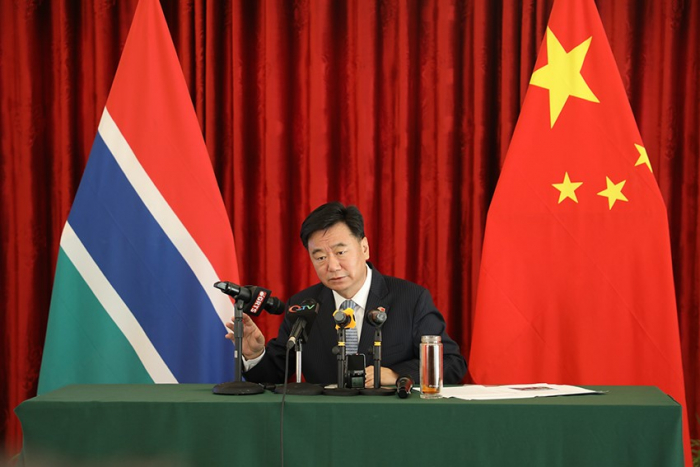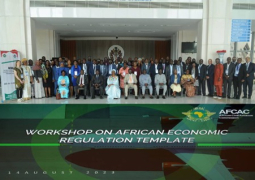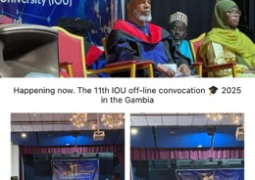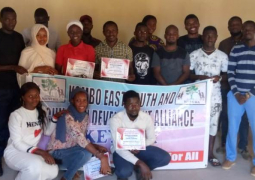
It’s an ideal that has always been cherished by the the Communist Party of China (CPC) and the Chinese people. Since the 18th CPC National Congress in 2012, with a deeper understanding of China’s path to democracy and the political system, the Party has developed whole-process people’s democracy as a key concept for governance. As the Chinese Ambassador to The Gambia, I would like to illustrate what is whole-process people’s democracy.
The whole-process people’s democracy is a complete institutional chain, including electoral democracy, consultative democracy, social democracy, primary-level democracy, citizen democracy, and all other elements of democratic politics. It covers democratic elections, democratic consultation, democratic decision-making, democratic management, democratic supervision, and all other fields of the democratic process. It is not only based on a complete institutional procedure but also full participation and practice. It is a democracy in terms of process and outcome. It achieves the integration of procedural and substantive democracy, and direct and indirect democracy. It is people’s democracy and at the same time represents the will of the state. It is the democracy that involves all links, covers all aspects, and the entire population. It is the most broad-based, genuine, and effective socialist democracy. With diverse, smooth, and orderly democratic channels, it effectively guarantees that all the Chinese people can engage in the management of state, economic, cultural, and social affairs through various ways and in various forms following the law.
President Xi said: “People’s democracy is a type of whole-process democracy. All major legislative decisions are made through due procedure and after democratic deliberation. It is a scientific and democratic decision-making process.”For instance, the compilation of the Chinese Civil Code is a vivid epitome of whole-process people’s democracy. During the compilation process, the National People’s Congress (NPC) Standing Committee deliberated the draft 10 times, solicited 10 rounds of public opinion, and organized 3 sessions for NPC deputies to discuss the draft. At the NPC annual session in 2020, over 100 amendments were made in light of opinions from various parties. It has been proved that the whole-process democracy works in China, and works very well.
The whole-process people’s democracy has fully stimulated the creative energy and enthusiasm of the Chinese people to build the country, enabling China to rapidly become the world’s second largest economy, successfully build a moderately prosperous society in all aspects and make absolute poverty history. In the face of the COVID-19, the CPC and the Chinese government have always insisted on putting people at the center, putting people’s rights to life and health in the first place, and uniting all sectors of society to work together to overcome the pandemic. The whole-process people’s democracy has also enabled China to develop a stable and united political situation, effectively safeguarding national sovereignty, security and development interests.
Recently, the sixth plenary session of the 19th central committee of the CPC was held in Beijing and released the resolution of the central committee of the CPC on the major achievements and historical experience of the party over the past century. The resolution states that “we should develop whole-process people’s democracy and ensure it is the people who run the country.”The CPC has held the banner of people’s democracy since its founding. According to the political philosophy of the CPC, democracy is not an adornment used for decorative purposes. It is used to solve problems faced by the people. The key to judge whether a country is democratic or notis to see whether the people indeed run the country. The people should not only cast votes actively, but also participate in the whole process of national affairs through democratic approaches. Such is the real democracy.
As a matter of fact, the democratic model across the globe cannot be the same and democracy can be realized in multiple ways. Whether a country’s path works depends on whether it meets the country’s realities, follows the trend of times, and brings about economic development, social progress, and better lives for the people. Democracy is not an exclusive privilege of a few countries and should also be reflected in international relations. Today’s world is experiencing change on a scale unseen in a century. Democracy should not be misused to instigate division, damage cooperation, and infringe on sovereignty of other countries. All paths to democracy chosen by the peoples themselves deserve proper respect.
Recently, The Gambia has just successfully held the Presidential Election and duly elected the president of The Gambia. The Chinese people will work together with The Gambian people to carry forward the common values of humanity – peace, development, fairness, justice, democracy and freedom. In a spirit of mutual respect and following the principle of seeking common ground while setting aside differences, we will add new elements to the world’s political structure and advance towards a global community of shared future together.
Read Other Articles In National News





